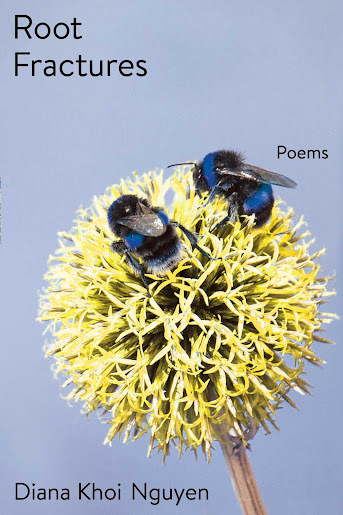Diana Khoi Nguyen, Root Fractures
A girl dug a hole at thebeach, sent her siblings to fetch water.
She found pleasure in it.All things fall down, or want to,
so she dug and dug, hertrowel falling deeper, the earth growing darker.
She thought in concentriccircles, the tides coming
and going, overlapping eachother. When she poured water in,
the hole filled up, thenemptied, its walls caved in. She began again.
If she could have, shewould have dug a hole every day, one
beside the other, thenanother, and another. A hole is a hole,
but none of them are thesame.
Along a shore, no one canknow how many holes there are.
Along a shore, no one canknow which holes are hers. (“A Story About Holes”)
 Struckimmediately by Pittsburgh-based poet Diana Khoi Nguyen’s stunning full-lengthdebut,
Ghost Of
(Omnidawn, 2018) [see my review of such here], I was pleasedto hear of her follow-up collection,
Root Fractures
(Scribner, 2024).Nguyen writes of connection and disconnection, breaks and attempts into healing.“my work inspires mother to write poems I will inherit from her,” she writes, toopen one of the short lyric “Cape Disappointment” poems, a title that repeatsthroughout the collection, “tears on the page denature like egg whites [.]” RootFractures is a collection that explores and expands upon slow and eventualloss, of fracturing itself, from her parents leaving Vietnam to the death ofher brother, and how deeply that loss permeates every aspect of the remainingfamily structure. Through sharp lyrics, she examines the breaks, and their ongoingoutcomes across years, across generations. These are poems with a gravitationalpull, one that highlights loss and disappearance, and the grief that can’t helpbut rush to occupy those absences. The sequence “A Story About Holes,” one ofthe anchors of the collection, offers: “This is a story about two particles.They are travelling near / an event horizon. Life at the edge can beparticular. One / of the pair falls in with a negative valence / which sucksout energy from the black hole. // The other particle, its counterpoint, escapeswith positive energy. / No one knows how.” Nguyen offers an evocative expanseand stretch of detail, akin to a constellation, from how her parents first metto the shadow of war that forced them to leave, through to the multiple waysher brother worked to remove himself from the family landscape, until hefinally did, becoming that absence that couldn’t help but outline for those whoremained. In portraits, how he become shadow, a text that is perpetually erasedand rewritten, held in place. “open the window to erase your ghost or maybe letone in,” another “Cape Disappointment” poem offers, furthering Nguyen’s occasionalrepeat set akin to short asides from the main narrative threads of thecollection, “I unlatch like a cello case, air filling every dent in the velvet[.]”
Struckimmediately by Pittsburgh-based poet Diana Khoi Nguyen’s stunning full-lengthdebut,
Ghost Of
(Omnidawn, 2018) [see my review of such here], I was pleasedto hear of her follow-up collection,
Root Fractures
(Scribner, 2024).Nguyen writes of connection and disconnection, breaks and attempts into healing.“my work inspires mother to write poems I will inherit from her,” she writes, toopen one of the short lyric “Cape Disappointment” poems, a title that repeatsthroughout the collection, “tears on the page denature like egg whites [.]” RootFractures is a collection that explores and expands upon slow and eventualloss, of fracturing itself, from her parents leaving Vietnam to the death ofher brother, and how deeply that loss permeates every aspect of the remainingfamily structure. Through sharp lyrics, she examines the breaks, and their ongoingoutcomes across years, across generations. These are poems with a gravitationalpull, one that highlights loss and disappearance, and the grief that can’t helpbut rush to occupy those absences. The sequence “A Story About Holes,” one ofthe anchors of the collection, offers: “This is a story about two particles.They are travelling near / an event horizon. Life at the edge can beparticular. One / of the pair falls in with a negative valence / which sucksout energy from the black hole. // The other particle, its counterpoint, escapeswith positive energy. / No one knows how.” Nguyen offers an evocative expanseand stretch of detail, akin to a constellation, from how her parents first metto the shadow of war that forced them to leave, through to the multiple waysher brother worked to remove himself from the family landscape, until hefinally did, becoming that absence that couldn’t help but outline for those whoremained. In portraits, how he become shadow, a text that is perpetually erasedand rewritten, held in place. “open the window to erase your ghost or maybe letone in,” another “Cape Disappointment” poem offers, furthering Nguyen’s occasionalrepeat set akin to short asides from the main narrative threads of thecollection, “I unlatch like a cello case, air filling every dent in the velvet[.]”
Published on April 26, 2024 05:31
No comments have been added yet.



